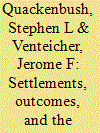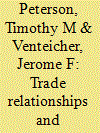| Srl | Item |
| 1 |
ID:
084990


|
|
|
|
|
| Publication |
2008.
|
| Summary/Abstract |
Despite the hope that the resolution of one militarized dispute will bring peace to a dyad, these conflicts often recur. This recurrence of conflict is particularly important because subsequent disputes within a dyad tend to be more severe than previous ones. However, the factors leading to recurrent conflict remain a matter of debate. While some argue that the settlement of a dispute has a significant impact on post-conflict relations, others argue that the outcome of a dispute is the most important determinant of post-conflict stability. Although evidence has been found to support both views, the relative impact of dispute settlements and outcomes has not been satisfactorily determined. Accordingly, this article simultaneously examines the relationship between settlements, outcomes, and conflict recurrence through survival analyses of the periods of peace following 2,973 dyadic militarized interstate disputes between 1816 and 2001. The authors find that although settlement type is an important predictor of recurrent conflict, with imposed settlements being the most stable, outcome type has no significant effects on post-dispute peace duration. The article concludes with a preliminary analysis of the factors that lead to the varying forms of settlement.
|
|
|
|
|
|
|
|
|
|
|
|
|
|
|
|
| 2 |
ID:
120981


|
|
|
|
|
| Publication |
2013.
|
| Summary/Abstract |
In this paper, we demonstrate that dependence on trade influences asymmetric crisis perception. Unilateral crisis perception is more likely to persist when the initiator of the crisis does not depend on trade with the target because in this case the target lacks capability to harm the initiator. Conversely, when the initiator is dependent on trade with the target, mutual crisis perception occurs sooner. Additionally, a state is more likely first to perceive a threat from another state-beginning a crisis as a target-when its trade dependence on that state is high. We find support for these expectations in survival time regressions and probit models spanning the period from 1919 to 2001.
|
|
|
|
|
|
|
|
|
|
|
|
|
|
|
|